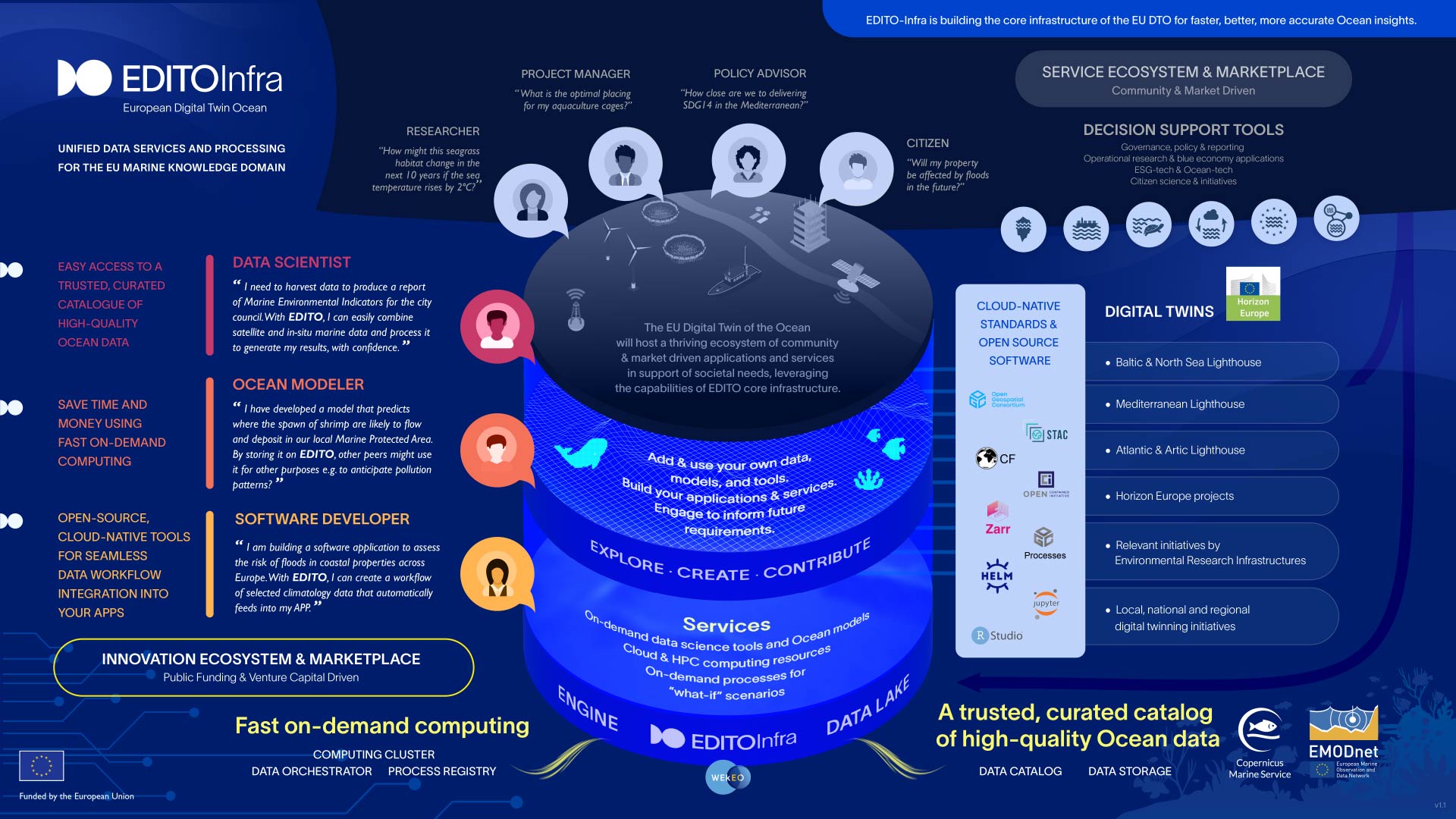Happy New Year
From EDITO
ISSUE I | January 2024

As we welcome the new year, we are thrilled to highlight EDITO’s key achievements in 2023 and share upcoming milestones and events towards the co-creation of the European Digital Twin Ocean (EU DTO). Our teams, working on Horizon Europe projects EDITO-Infra and EDITO-Model Lab, have diligently crafted the digital architecture of the EDITO virtual platform. This includes a data lake, processing engine, virtual simulation environment, and more.
The EDITO Data Lake integrates components from existing EU ocean data programmes, such as the Copernicus Marine Service and EMODnet, creating a robust core infrastructure. Once launched, it will pave the way for a thriving EU DTO digital ecosystem, with additional projects aiming for full operational status by the end of 2024.

Milestones & Achievements
EDITO-Infra platform is now up and running
The EDITO-Infra platform is now live, offering a beta version as a central hub for digital twins of the ocean. Through the engagement of various stakeholders, such as the Copernicus Marine and EMODnet communities, and through interaction with European projects, as the EDITO-Model Lab and ILIAD projects, and with other EU and national digital twinning initiatives during the second edition of the Digital Ocean Forum (Brussels, June 2023), the platform has evolved. In late 2023, beta testing began with key stakeholders, and in early 2024, EDITO-Infra will expand beta testing through Demonstration and Integration Calls. This inclusive approach aims to ensure the platform meets diverse user needs and contributes to a comprehensive digital twin of the ocean that can boost a more sustainable management of marine environments.

EDITO-Model Lab integrates co-design elements and components
EDITO-Model Lab advances the next-gen ocean numerical models, blending AI and high-performance computing for novel simulation of Focus Applications and What-if Scenarios, adding important developments to the existing European ocean numerical modelling landscape. In 2023, various co-design elements were created:
Co-design of the integration path for the core model suite (including AI-based ocean emulators and underlying models)
Co-design of the Focus Applications and the What-if scenarios, signalling our readiness to start the integration into the EU DTO public infrastructure in 2024

Showcasing the EDITO initiative in European and international events in 2023
EDITO-Infra Technical Workshop for Community
November 2023
The EDITO-Infra & EMODnet Technical Workshop offered a vital overview of the platform’s status. Featuring presentations from Copernicus Marine, Mercator Ocean International, the Flanders Marine Institute (VLIZ), and EMODnet Secretariat, the workshop introduced participants to the EDITO (beta) platform’s functionalities. The EDITO Technical Team led a live demonstration, providing a comprehensive view of the platform’s capabilities. This hands-on session enabled the EMODnet community to engage with EDITO and offer valuable feedback during the early stages of development.
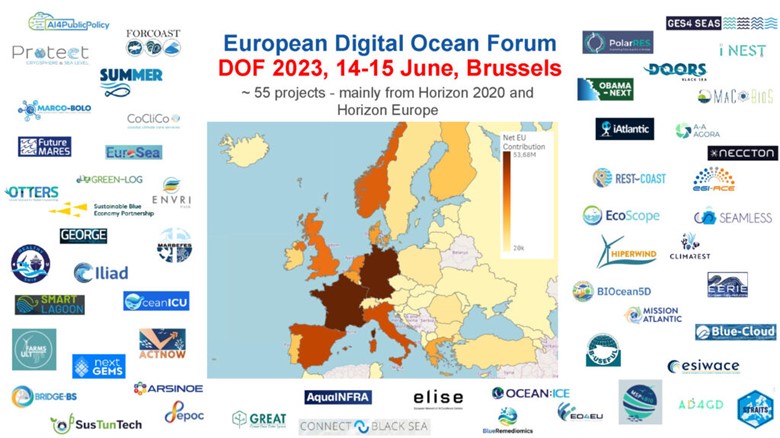
2nd Digital Ocean Forum
Brussels, Belgium, 14-15 June 2023
On 14 and 15 June 2023, the European Commission hosted the second edition of the Digital Ocean Forum with support from Mercator Ocean International and the Flanders Marine Institute (VLIZ) – the two main partners leading the development of the core infrastructure of the EU DTO. This event brought together more than 200 experts, stakeholders, researchers, policymakers and interested citizens to discuss progress and shape the future of the EU DTO.
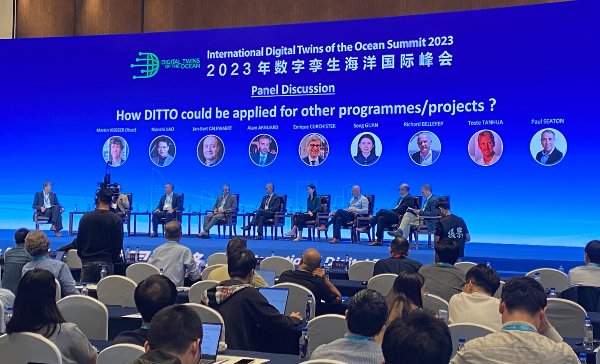
International Digital Twins of the Ocean Summit
Xiamen, China, 9-12 Nov 2023
The International Digital Twins of the Ocean (DITTO) Summit showcased global digital twins of the ocean initiatives. Ocean experts, researchers, and stakeholders shared projects and advancements, focusing on collaborative efforts for marine ecosystem conservation, a more sustainable blue economy, and climate change resilience. Initiated by the DITTO programme, the summit reflects a global commitment to exchanging best practices in DTO development. Key sessions celebrated the EU DTO as an exemplary initiative, with representatives from EDITO-Infra and EDITO-Model Lab highlighting its innovative architecture and co-design experience.
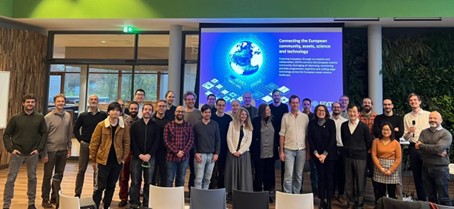
EDITO-Model Lab Co-design Events, Toulouse and Delft
October & November 2023
The EDITO-Model Lab Users’ Co-Design Meeting at Mercator Ocean International, in Toulouse, France, showcased collaborative efforts with 30 beta-testers and remote participants, refining the Virtual Ocean Model Lab (VOML) for the EU DTO. Participants engaged in hands-on experiences, testing functionalities, integrating new datasets, and participating in an exciting hackathon. Following this, the Co-Design Review Workshop in Delft, The Netherlands, brought together over 60 participants including numerous external stakeholders and users, validating components crucial for the EDITO-Model Lab Technical Architecture. As the co-design phase concludes, the project’s team is set to launch the integration phase, consolidating components into the first demonstrator of the EU DTO.
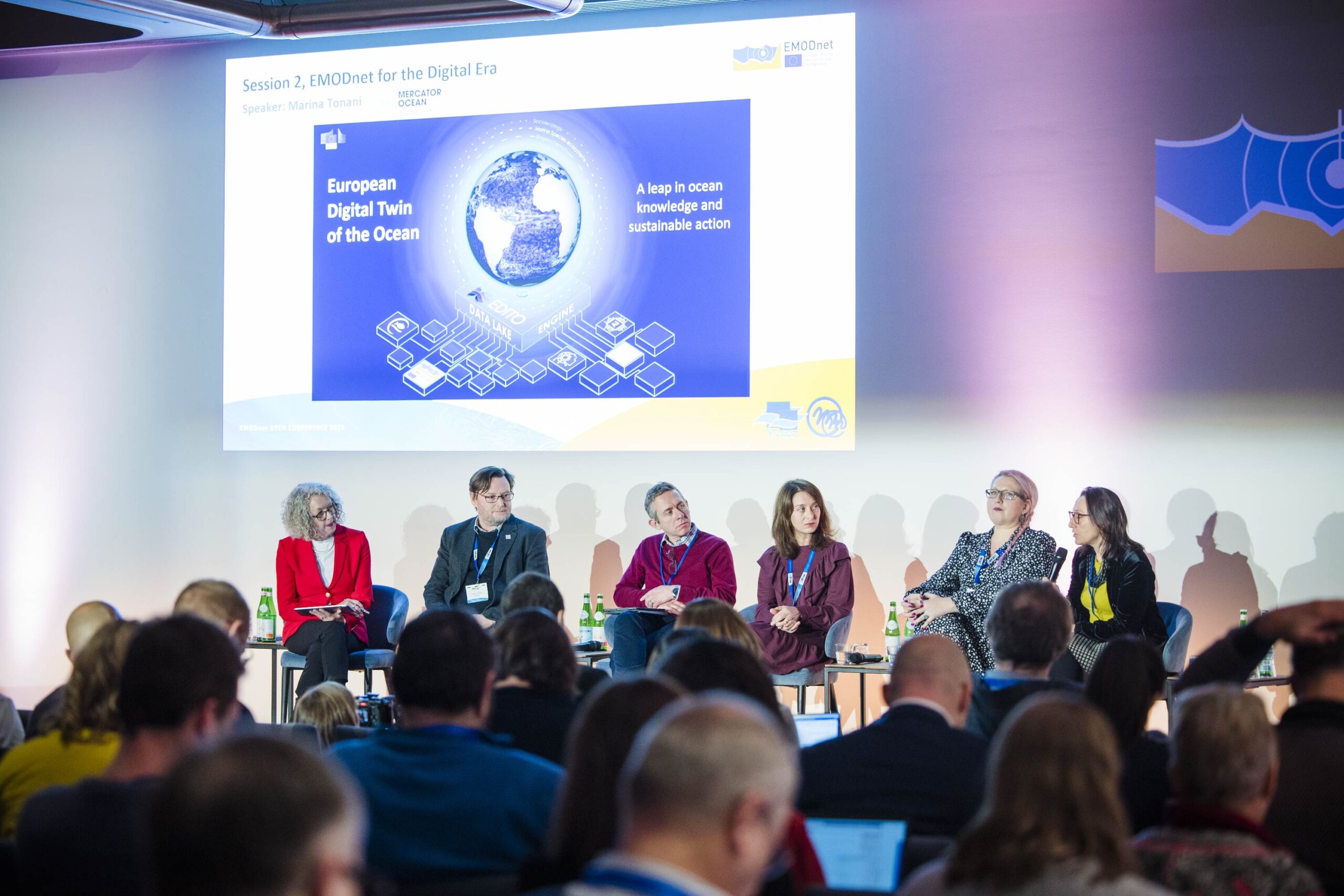
EMODnet Open Conference
Brussels, Belgium, November 2023
This event gathered a panel of experts spanning EMODnet, European Commission, Copernicus Marine Service, and Mercator Ocean International representatives and wider initiatives explored the interplay of cutting-edge technology within EMODnet, its role in the EU DTO, including via the EDITO-Infra initiative, and discussed collaborations with Destination Earth and related Horizon Europe projects.

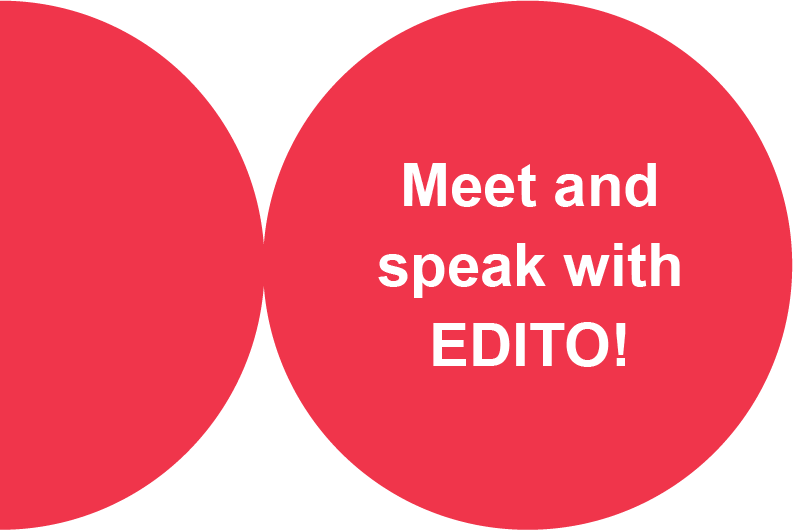
EDITO Model Lab General Assembly
Lecce, Italy
16-18 January 2024
Blue-Cloud 2026 DTO Task Force & Workshop
Toulouse, France
February 2024
2024 Ocean Decade Conference
Barcelona, Spain
8-12 April 2024
European Maritime Day 2024
Svendborg, Denmark
30 – 31 May 2024
3rd Digital Ocean Forum
Brussels, Belgium
12-13 June 2024

